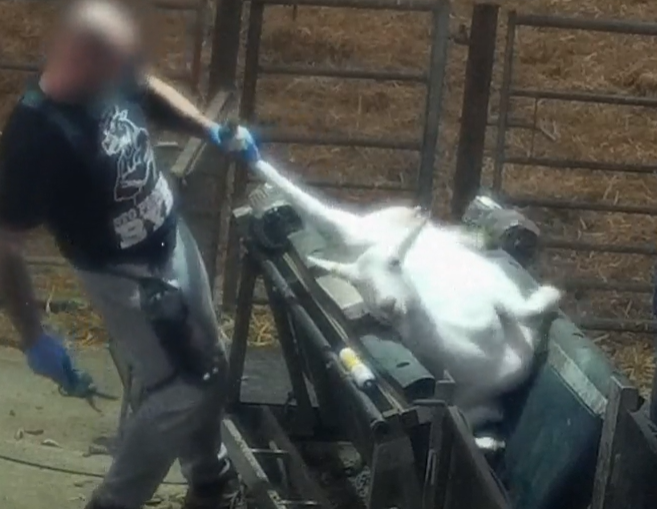Goat milk cruelty: Activists work to save animals at scandal-hit farm linked to UK’s biggest producer
Exclusive: Animal-rights group behind secret footage find sanctuary places for one in 10 of the animals and appeals for more
Activists are working to save the 4,000 goats at a farm where workers were caught brutally attacking the animals in a scandal that led to three people being sacked.
Animal-rights group Surge is also pressing farm bosses to accept help in switching to farming plants instead of goats.
The owner of Far Marsh Farm in East Yorkshire told The Independent it may have to shut down after secret camera footage revealed workers inflicting agonising injuries on the animals.
Goats were punched, hit with a pole, dragged by their ears and slammed down, leaving some so crippled they struggled to stand up.
The farm is one of a number that supplied goat milk to St Helen’s Farm, the UK’s biggest goat-milk brand, before The Independent exposed the cruelty.
Marks & Spencer and all the big supermarkets except Morrisons said they pulled from sale St Helen’s products, including milk, cheese and butter, after seeing the footage.
Surge, which obtained the footage – filmed last month – says it has secured spaces at animal sanctuaries for 42 of Far Marsh Farm’s goats, and is appealing to people who could home others to join a rescue operation.
The group also wants supporters to contact St Helen’s to lobby for the goats to be handed over.
The activists are working with a company that specialises in helping dairy farmers to switch to producing plant milk and convert their land into sanctuaries.
The company, Refarm’d, is offering to use the farm infrastructure to set up “vertical” farms – where plants are grown on suspended shelves in stacks. Advocates of vertical farming say benefits include eliminating run-off of polluted water and reducing food air miles.
The video footage showed goats at Far Marsh Farm crying out in pain as they were held by their necks, had their ears tagged or had their tails twisted. Animal suffering was also prolonged when injuries went untreated, the witnesses said.
Three out of the farm’s 10 staff have been dismissed for gross misconduct while a fourth has been placed on a final written warning.
The RSPCA, which acts as prosecutor in animal-cruelty cases, says the government’s Animal and Plant Health Agency (APHA) has been informed, and that its officers may act if APHA fails to.
After the supermarkets dropped St Helen’s products, the company posted an “out of stock” message on its website, saying: “We appreciate that you will not be able to get hold of our products while this investigation is taking place and would like to thank you for your patience while we deal with this distressing issue.”
It said it had stopped dealing with Far Marsh Farm and launched an investigation into welfare standards at its other supply farms.
A Surge spokesman said: “We are fully at the ready to help these goats live the rest of their lives in a safe home – and through our work with Refarm’d in helping farmers transition from animal farming to plant farming, we are fully at the ready to help St Helen’s transition from goat milk to oat milk farming.
“Both options, oat milk or vertical farming, create a source of sustainable income, while also positively benefiting the environment and eliminating animal suffering.”
Angus Wielkopolski, founder of Yorkshire Dairy Goats, which owns the farm, told The Independent: “We are totally shocked and disgusted by what we have seen on that video. We are horrified. We had no idea this was going on. If we had known, we would have stopped it instantly.”

Join our commenting forum
Join thought-provoking conversations, follow other Independent readers and see their replies
Comments
Bookmark popover
Removed from bookmarks